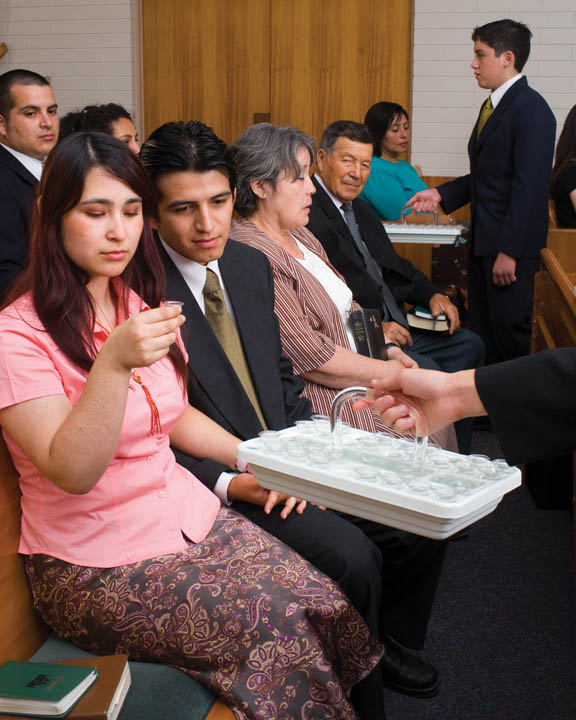In the Bible, in the New Testament, in 1 Corinthians 11:24-29 we read the following:
And when he had given thanks, he brake it, and said, Take, eat: this is my body, which is broken for you: this do in remembrance of me. After the same manner also he took the cup, when he had supped, saying, This cup is the new testament in my blood: this do ye, as oft as ye drink it, in remembrance of me.
For as often as ye eat this bread, and drink this cup, ye do shew the Lord’s death till he come. Wherefore whosoever shall eat this bread, and drink this cup of the Lord, unworthily, shall be guilty of the body and blood of the Lord. But let a man examine himself, and so let him eat of that bread, and drink of that cup. For he that eateth and drinketh unworthily, eateth and drinketh damnation to himself, not discerning the Lord’s body.
Most Christians reading these verses understand that what is being talked about here is what is commonly referred to in Protestantism as the Holy Communion, in Catholicism as the Holy Eucharist, and by members of The Church of Jesus Christ of Latter-day Saints (mistakenly referred to by many in the world as the Mormon Church) as the Sacrament. Regardless of the religious terminology that is used, the symbolism which is presented in the administering of the sacred ordinance is the same.
Whenever we partake of this sacred ordinance in Mormonism, we do so remembering the atoning sacrifice that Christ made for each of us in order that we could be set free from the sin that spiritually separates us from our Heavenly Father, and have a way to one day return home to live with Him for all eternity.
 The bread that we partake of is symbolic of our Savior’s body which was broken and bruised for us, and the wine or grape juice that is used in some churches (water is used in The Church of Jesus Christ of Latter-day Saints), is symbolic of His precious blood which was shed for us. The Old Testament Prophet Isaiah helps to remind us what the Savior did for us and why we partake of this sacred ordinance. In Isaiah 53: 4-6 are recorded these words:
The bread that we partake of is symbolic of our Savior’s body which was broken and bruised for us, and the wine or grape juice that is used in some churches (water is used in The Church of Jesus Christ of Latter-day Saints), is symbolic of His precious blood which was shed for us. The Old Testament Prophet Isaiah helps to remind us what the Savior did for us and why we partake of this sacred ordinance. In Isaiah 53: 4-6 are recorded these words:
Surely he hath borne our griefs, and carried our sorrows: yet we did esteem him stricken, smitten of God, and afflicted. But he was wounded for our transgressions, he was bruised for our iniquities: the chastisement of our peace was upon him; and with his stripes we are healed. All we like sheep have gone astray; we have turned every one to his own way; and the Lord hath laid on him the iniquity of us all.
There are some churches which administer this sacred ordinance on a weekly basis. There are others, like the Baptist Church that I grew up in, that only observe the ordinance once per month, and still there are others that observe the sacred ordinance on an even less frequent cycle of once per quarter. Regardless of the time interval that is used, we should always partake of the ordinance in remembrance of the Crucified One – our Lord, Savior, Master, and Redeemer – the Lord Jesus Christ.
As we partake of the emblems of the Sacrament, we not only remember our Savior and His atoning sacrifice, but it is also a time for us to examine ourselves and reflect upon the relationship that we have with Jesus Christ, and to renew the covenants which we made at the time of our Mormon baptism.
In a General Conference address given in October 2008, Elder Dallin H. Oaks, a modern day Apostle of the Lord Jesus Christ, gave these remarks concerning the Sacrament in his message titled ” Sacrament Meeting and the Sacrament”:
By participating weekly and appropriately in the ordinance of the sacrament we qualify for the promise that we will “always have his Spirit to be with [us]” (D&C 20:77). That Spirit is the foundation of our testimony. It testifies of the Father and the Son, brings all things to our remembrance, and leads us into truth. It is the compass to guide us on our path. This gift of the Holy Ghost, President Wilford Woodruff taught, “is the greatest gift that can be bestowed upon man” (Deseret Weekly, Apr. 6, 1889, 451).
In that same message, Elder Oaks continued:
“The ordinance of the sacrament makes the sacrament meeting the most sacred and important meeting in the Church. It is the only Sabbath meeting the entire family can attend together. Its content in addition to the sacrament should always be planned and presented to focus our attention on the Atonement and teachings of the Lord Jesus Christ.
“It is for these reasons that the Sacrament is administered, passed, and received by the members in an atmosphere of quiet reverence. The conducting of the meeting, including any necessary business, is brief and dignified, and the talks that have been prepared by those members who have been assigned to speak during the meeting, are spiritual in both content and delivery. The music that is chosen for the meeting is appropriate, as are the invocation that is given at the beginning of the meeting and the benediction that is given at the close of the meeting.
“In a world filled with turmoil and confusion, how can we live our lives in such a manner that we will always have the Holy Spirit to be with us and to guide us along the path that we should follow? The answer is found in the commandment given by the Lord in modern day revelation as recorded in D&C 59:9-10: “And that thou mayest more fully keep thyself unspotted from the world, thou shalt go to the house of prayer and offer up thy sacraments upon my holy day; For verily this is a day appointed unto you to rest from your labors, and to pay thy devotions unto the Most High”
Elder Oaks concluded his message with this instruction:
“We need to qualify for the cleansing power of the Atonement of Jesus Christ. We do this by keeping His commandment to come to Him with a broken heart and a contrite spirit and in that wonderful weekly meeting partake of the emblems of the sacrament and make the covenants that qualify us for the precious promise that we will always have His Spirit to be with us” (see D&C 20:77).
 Keith L. Brown is a convert to The Church of Jesus Christ of Latter-day Saints and serves as the Ward Mission Leader in the Annapolis, Maryland Ward.
Keith L. Brown is a convert to The Church of Jesus Christ of Latter-day Saints and serves as the Ward Mission Leader in the Annapolis, Maryland Ward.
